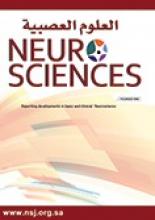Abstract
OBJECTIVE: To investigate homocysteine levels in Alzheimer’s disease and its relationship with the severity of disease.
METHODS: This investigation was performed as a case-control study on 40 Alzheimer patients and 40 non-Alzheimer patients in Tabriz, Iran from May 2006 to September 2007. Alzheimer patients were selected based on the criteria of the American Psychological Association. The severity of illness was determined based on Reisberg scale. Mental status of the patients was evaluated by Mini Mental State Examination (MMSE). The serum levels of homocysteine were measured by enzyme-linked immunosorbent assay method.
RESULTS: The average serum homocysteine level in the 40 patient group was 23.01+/-14.40mmol/L, and in the 40 patient control group was 15.40+/-6.23 (p=0.003). The average serum homocysteine level in the first group of patients was 21.7+/-12.7mmol/L, in the second group 22.3+/-13.8, and in the third group 24.9 +/- 17.2. The relationship between MMSE score and serum homocysteine level of patients was not significant (p=0.4).
CONCLUSION: The average serum homocysteine level in Alzheimer patients was higher than in the control group, however, it did not show a significant relationship with the severity of illness.
- Copyright: © Neurosciences
Neurosciences is an Open Access journal and articles published are distributed under the terms of the Creative Commons Attribution-NonCommercial License (CC BY-NC). Readers may copy, distribute, and display the work for non-commercial purposes with the proper citation of the original work.






